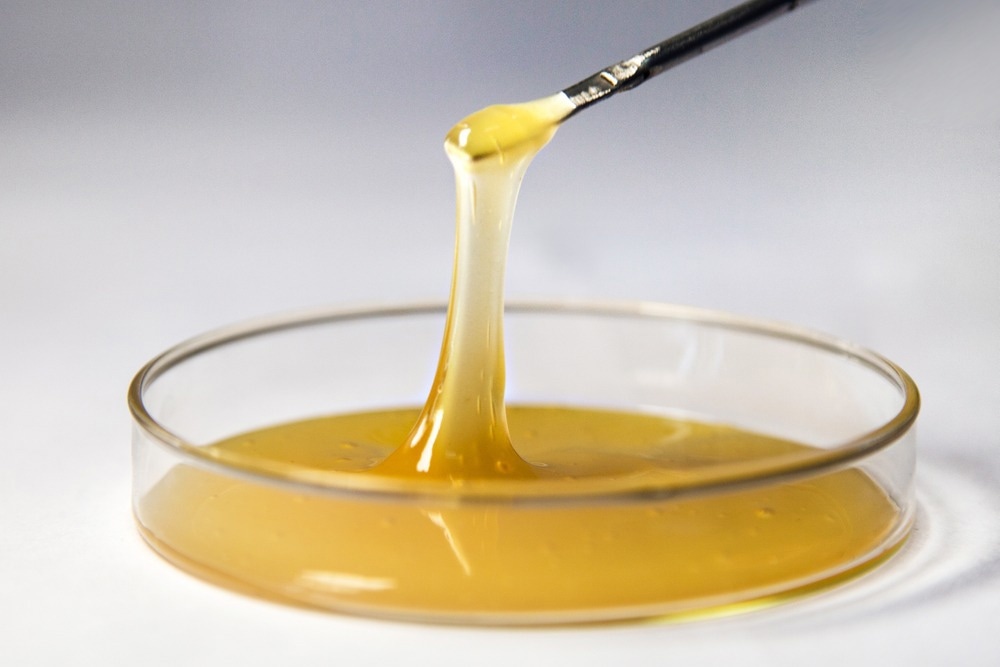Updated by Reginald Davey 03/05/23
Viscosity is a key property of fluids that is affected by numerous factors. This article will provide an overview of several salient points related to viscosity in gases and liquids and the effect of viscosity on fluids.

Image Credit: Akim Lakeev/Shutterstock.com
Introduction: What is Viscosity?
To understand viscosity, laminar flow must be understood. This is when a gas or fluid flowing over a surface results in the molecules next to the surface having zero speed. As the distance from the fluid’s surface increases, there is an increase in speed.
Internal friction within the gas or liquid is responsible for this difference in speed. Simply put, this is molecular friction as a result of molecules being pushed past each other.
The strength with which molecules “cling” together is proportional to the friction present. This strength is known as viscosity. Viscosity determines the friction amount, which determines the amount of energy absorbed by the flow.
Different gases and liquids have different viscosities under standard conditions. At 20oC, water has a viscosity of 1.002 mPa s. Ordinary liquids range in viscosity from 1-1000 mPa s. Most gases range from 1-10 μPa s.
Fluid Viscosity
In basic terms, fluid viscosity is a measure of how “sticky” a fluid (either gas or liquid) is. Water, for instance, has low viscosity, whereas syrup has a relatively high viscosity. Viscosity is influenced by temperature: engine oil has higher viscosity at elevated temperatures than in, say, winter.
Factors Which Influence Viscosity in Liquids and Gases
As mentioned above, fluid viscosity changes with temperature. Pressure has a small impact on viscosity in both gases and liquids. Applying force to a fluid can increase or decrease its velocity.
Temperature is a key factor that influences a fluid’s viscosity. How higher temperatures affect a fluid’s viscosity is different in either a gas or a liquid. In a liquid, viscosity generally decreases with increasing temperature, whereas in a gas it generally increases.
What Does High Viscosity Mean for Fluids?
High viscosity liquids include common food products such as honey, syrups, mayonnaise, and semi-solid food products. Glue, gylcerine, and other common examples of commercial and industrial chemicals similarly are highly viscous.
Fluids with high viscosity are commonly employed to dampen motion in numerous pieces of industrial and commercial equipment. Brake fluid, for instance, is used in hydraulic braking systems for automobiles and industrial plant machinery, which stops the vehicle in case of an emergency or as a standard operational procedure.
Viscosity in Multiphase Fluids
When studying multiphase liquids (mixtures of gases, liquids, and solids), there are other factors that come into play.
Crude oil flowing up an oil well is an example of a multiphase liquid. Part of the oil often turns to gas as pressure reduces and the mixture could also include water, pieces of rock, wax, and tar. The fraction of each phase will impact the mixture’s velocity.
Foams such as mixtures of liquids and gas and emulsions can exhibit higher apparent viscosity than either individual phase on its own.
For large organic molecules such as plastics formed by combining a number of smaller molecules, viscosity is generally higher for molecules with higher molecular weights.
A dilute polymer solution in a solvent, for instance, can display power-law behavior where it may have high viscosity under low shear but low viscosity under high shear.
Water is a Newtonian fluid, but the introduction of a polymer in concentrations (by weight) as low as 0.2 % can have a large effect on its rheological behavior.
The Effect of Viscosity on Pipes
Viscosity produces a resistive force for fluids flowing through pipes. Essentially, it is a frictional force acting between parts of the fluid traveling at different speeds.
The fluid nearer the pipe walls travels slower than the fluid in the center of the pipe. Knowledge of how viscosity is affected by temperature, pressure, force, or the complex factors in multiphase fluids ensures the proper operation of industrial and commercial equipment.
In Summary
Viscosity is a highly important property of fluids and liquids that determines their industrial or commercial use. Different factors such as temperature, pressure, applied force, and complex multiphase liquid properties can influence the viscosity of a fluid.
Fungilab Presentation Final

This information has been sourced, reviewed and adapted from materials provided by Fungilab.